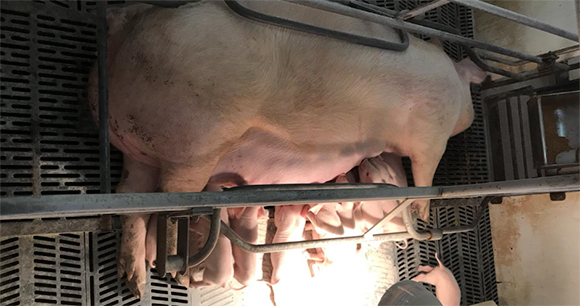
Washington, DC—The Animal Welfare Institute (AWI) released a new report today that documents how state-level farmed animal welfare laws continue to be minimally enforced, even though such laws could substantially improve the lives of many of the 9 billion farmed animals raised and killed in this country each year.
No federal law explicitly regulates the on-farm treatment of animals (except the small percentage raised organically). Due to growing public concern, often reflected in citizen-initiated ballot measures, a number of states have enacted measures over the past 25 years to improve the welfare of these animals.
Across 18 states, a total of 44 on-farm animal protection measures are currently in place. AWI surveyed each of these states to determine whether the provisions of those laws and/or regulations are being enforced and, if so, to what degree. To conduct this research, AWI submitted public records requests for documents related to all enforcement activity occurring between September 2019 and February 2023. In response, AWI received records indicating some level of enforcement relating to only 12 of the laws in 10 of the states.
“Our analysis shows that state laws enacted to improve farmed animal welfare are not being diligently enforced,” said Adrienne Craig, senior policy associate and staff attorney for AWI’s Farmed Animal Program. “How these laws are drafted — including the specific powers given to a state agency and the instructions for that agency to carry out investigations and prosecutions — have an enormous impact on their efficacy. We need to ensure that these hard-won protections are not undermined during implementation.”
State laws protecting farmed animals fall into three main categories: (1) on-farm minimum animal care standards, (2) bans on the sale of products from facilities that do not meet certain animal care standards, and (3) laws prohibiting specific conventional industry practices, such as tail docking and intensive confinement in gestation crates for pregnant sows or battery cages for egg-laying hens. Animal care standards provide minimum guidance for the care and treatment of farmed animals, including access to adequate food, water, shelter, and veterinary care. Generally, such laws authorize state governments to investigate complaints from citizens or agencies; these provisions are separate from state cruelty statutes (which may provide little or no protection for farmed animals).
Similar to what AWI documented in its 2019 report — the first-ever comprehensive analysis of state enforcement of farmed animal protections — minimum animal care standards overall had the most evidence of consistent enforcement during the recent survey period. Ohio, New Jersey, and Indiana supplied the most extensive evidence of enforcement.
In Ohio, for instance, the state Department of Agriculture is tasked with investigating complaints and enforcing the rules, including levying fines or seeking injunctions through the court. State records show that, from September 2019 through February 2023, the department conducted more than 100 investigations — the most of any state — and fined multiple producers, including one penalty totaling $15,000.
Kentucky, by contrast, passed animal care standards and banned veal calf crates in 2014 and 2018, respectively, yet the state’s Department of Agriculture provided AWI with no enforcement records. In Nevada, the legislature passed a law (effective July 2022) requiring that eggs produced or sold in the state come from hens with at least one square foot of space each. Yet a records officer from the Nevada Department of Agriculture informed AWI that contrary to a legislative directive, the department leaves it up to retailers to ensure compliance.
Of the 30 state laws or regulations that ban a specific industry practice, AWI received enforcement records for only two: Ohio’s tail docking ban (incorporated within its minimum animal care standards) and Colorado’s hen housing standards. One possible reason for this lack of enforcement is that most of these laws do not assign an official agency to proactively confirm compliance.
Since AWI’s last survey, new farmed animal protection laws and regulations have taken effect in six states, but there has not been a dramatic increase in the overall enforcement of such laws. The most significant changes included sales bans in California and Massachusetts on animal products derived from animals subjected to extreme confinement. These laws have faced long legal battles, delaying implementation and enforcement.
AWI’s report lists several recommendations for drafting the most effective farmed animal protection laws. Among them:
- For livestock care standards
- Include clear language establishing a mechanism for complaints and an obligation for the appropriate state agency to investigate complaints and follow up. Severe violations, such as failure to seek veterinary care for animal injuries or causing an animal to become emaciated, must be enforced and not left to the discretion of the agency.
- Periodically review minimum care standards to ensure they reflect the latest animal welfare science. Establishing minimum standards should not preclude state legislatures from adopting additional, stricter standards.
- For sales bans
- Direct a single responsible agency to require producers and distributors to prove compliance through on-farm inspections, which can be performed by a competent third-party certifier.
- Establish fines for noncompliance that are high enough to discourage violations instead of allowing producers and retailers to treat them merely as the cost of doing business.
Marjorie Fishman, Animal Welfare Institute
202-446-2128, [email protected]
The Animal Welfare Institute is a nonprofit charitable organization founded in 1951 and dedicated to reducing animal suffering caused by people. AWI engages policymakers, scientists, industry, and the public to achieve better treatment of animals everywhere—in the laboratory, on the farm, in commerce, at home, and in the wild. Follow us on Facebook, X (formerly Twitter), and Instagram for updates and other important animal protection news.